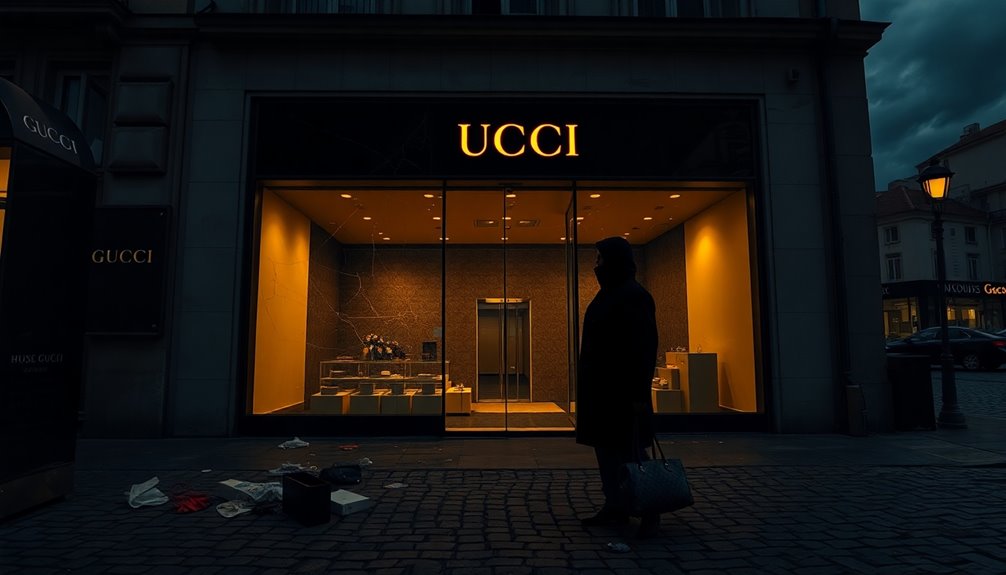The House of Gucci is facing significant challenges as sales decline and market pressures mount. With a projected sales drop and shifting consumer preferences, a complete brand overhaul might be necessary to adapt. New leadership is trying to implement strategic changes, but ongoing difficulties suggest that simply tweaking the current approach may not suffice. If Gucci wants to regain its luxury status, it must innovate while honoring its legacy. There's more to explore about what's next for the brand.
Key Takeaways
- Gucci faces significant sales declines, with a 20% drop and reliance on the brand for 70% of Kering's EBIT, indicating urgent need for change.
- Changing consumer preferences and economic uncertainties highlight the risks of Gucci's current market position, prompting discussions of a brand overhaul.
- The appointment of new leadership suggests a strategic pivot, aiming for innovation while maintaining Gucci's heritage amidst declining demand.
- Recent product launches and operational adjustments indicate attempts to revitalize the brand, but effectiveness remains uncertain in the evolving luxury market.
- A total brand overhaul may be necessary to adapt to market pressures, ensuring Gucci can balance legacy with contemporary consumer expectations.

As Gucci grapples with a shifting luxury landscape, it faces significant market signals that demand urgent attention. You'll notice that sales are projected to decline by 1% in 2025, and the brand's recent performance reflects this concerning trend. In the first half of 2024, Gucci's sales plummeted by 20%, dropping from $5.6 billion to $4.4 billion. This decline wasn't just a fluke; it's part of a broader pattern where retail sales have stagnated, indicating a troubling phase for one of the most iconic luxury brands.
The luxury market is experiencing pressures you can't ignore, stemming from changing consumer preferences and economic uncertainties. Competitors are closing in, forcing Gucci to rethink its brand positioning strategies. Despite efforts to elevate its image and align with contemporary trends, sustainable financial success seems elusive. You must consider how these struggles impact Kering, Gucci's parent company, which relies heavily on its star brand for nearly 70% of its EBIT.
To combat these challenges, Gucci has made strategic moves like appointing new leadership, including CEO Jean-François Palus and creative director Sabato De Sarno. They're also rolling out new handbag collections aimed at rekindling interest among luxury and aspirational customers alike. Operational adjustments, tighter cost controls, and a reassessment of non-essential projects are on the table, too. High costs from strategic revamps under the new creative director are also contributing to the brand's financial strain.
Looking ahead, there's cautious optimism. If market conditions stabilize and new products resonate well, Gucci could see a revenue recovery in the latter half of 2025. However, the luxury environment remains tough, and demand continues to soften.
As you observe these developments, it's clear that Gucci's path to regaining its luxury status will involve a careful balance between innovation and maintaining its storied legacy. The question remains: will a total brand overhaul become necessary to navigate these turbulent waters?
Frequently Asked Questions
What Are the Key Factors Driving House of Gucci's Market Evolution?
The key factors driving Gucci's market evolution are economic fluctuations, intense competition, and shifting consumer sentiments.
You'll notice that luxury shoppers now demand personalization and sustainability, which affects brand loyalty.
Additionally, the rise of digital engagement means you're more likely to shop online.
As Gucci navigates these challenges, it must adapt its strategies, focusing on emerging markets and enhancing its digital presence to maintain relevance and appeal to younger generations.
How Does Consumer Sentiment Affect House of Gucci's Brand Perception?
Consumer sentiment significantly shapes your perception of Gucci's brand.
When economic conditions weaken, you might hesitate to splurge on luxury items, impacting sales. If you value sustainability, Gucci's efforts in this area can enhance its appeal.
However, if you find their marketing tactics alienating, your loyalty may waver.
Ultimately, your feelings about social trends and brand image directly influence how you view Gucci, highlighting the importance of aligning with consumer expectations.
Who Are House of Gucci's Main Competitors in the Luxury Market?
As you stroll through a vibrant marketplace brimming with luxury, you'll spot House of Gucci's formidable competitors.
Louis Vuitton dazzles with its iconic monogram, while Prada flaunts its exquisite leather handbags.
Armani offers sleek elegance, and Chanel captivates with timeless sophistication.
Dior emerges with haute couture splendor, while Versace's bold designs make a statement.
Each brand weaves its unique story, creating a rich tapestry of luxury where Gucci must navigate its path.
What Role Does Social Media Play in House of Gucci's Marketing Strategy?
Social media plays a crucial role in Gucci's marketing strategy. You'll notice their strong presence on platforms like Instagram and TikTok, where they engage audiences through visually stunning content and creative challenges.
By collaborating with influencers, they boost brand visibility and reach younger demographics. Their use of augmented reality enhances online shopping experiences, making it more interactive.
What Demographic Is House of Gucci Targeting With Its Products?
Glitzy glamour grabs Gucci's gaze, targeting affluent individuals aged 25 to 45 who crave luxury and exclusivity.
You'll find fashion-forward fans and aspirational consumers alike, all eager for unique designs and fine craftsmanship.
Gucci's inclusive campaigns resonate with diverse demographics, appealing to both genders across global markets.
The brand thrives on innovation, engaging with younger audiences through social media while maintaining its strong presence in emerging luxury markets, especially in China.
Conclusion
As the market shifts, you can't ignore the signs that House of Gucci might need a bold transformation. Sure, some might argue that change could alienate loyal customers, but embracing innovation often attracts a new, diverse audience. A total brand overhaul could breathe fresh life into the iconic label, keeping it relevant in a competitive landscape. The question isn't whether change is necessary, but how House of Gucci can evolve while honoring its rich heritage.









